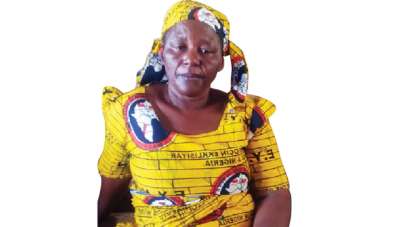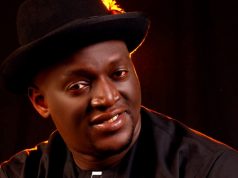On Monday, January 20, 2020, Boko Haram terrorists executed the CAN Chairman in the Michika Local Government Area of Adamawa State, Rev. Lawan Andimi. The cleric was abducted on January 2nd and a video was later released online confirming he was in Boko Haram custody. Information revealed that he was killed for refusing to convert to Islam after his ransom was increased by the terrorists from N50m to €2m (about N800m).
His wife, Mary; daughter, Abigail Daniel; and son, Timothy, tell HINDI LIVINUS about the trauma Andimi’s abduction and killing put the family through
Did your late husband have a premonition of danger or death before he was abducted by Boko Haram and eventually killed?
Yes, he had a dream about seeing stacks of wheat and tried to find out if all was well. I told him I had no clue about the meaning of such a dream. So we decided to pray and commit everything to God. That was four days before Boko Haram invaded Michika.
What kind of man was your husband?
My husband was a true man of God. He was also a very generous man. Although he wasn’t born into Christianity as he got converted at the age of 12, he was a committed Christian. Last Christmas, he gave out three bags of maize to the Fulani men in the neighbourhood and another bag to some members of the church to share.
If he had N1,000 and saw someone in need, he wouldn’t hesitate to give that person all the money. If there was a need in the church, he tried to meet it with his salary. At times, he bought clothes for underprivileged persons and widows. That was the kind of person he was; he was a very generous and humble man.
Do you know how he got converted to Christianity?
He was the only one in his family who made the decision to follow Christ, which he did at a very young age. He was led to Christ by Reverend Dauda Yaga, a missionary serving in Balala, who met him as a little shepherd boy. He later went to a Bible school after he heard the call of God. Dauda was instrumental to his conversion to the Christian faith. This happened after Reverend Dauda met his family and pleaded with them to allow him to have western education. I remember him telling me the pastor had told his parents some missionaries in Damboa at the time wanted the young lad to go to school. He (my husband) had also persuaded him to let him gain western education.
After his early education, he earned a Grade II Teachers’ Certificate and taught for nine years. We got married while he was still a teacher.
After he answered the call of God, he proceeded to a Bible School in 1989. And in 1993, he began to serve as a priest in Hildi. He was later ordained as a pastor in 1996. His work as a priest took him to Gombi, Michika, Abuja and Maiduguri. He served as Secretary, District Church Council in Abuja. Although he had served in Michika, he never protested his last posting to Michika. He had previously served in Michika. He took it as the will of God. And it was here the devil carried out the act.
On the day Boko Haram struck, were you with him?
I was here in the house. He had just returned from a church engagement in a nearby village, from where he also proceeded for a send-off not far from here. He returned home late in the afternoon and I served him his meal after he had taken a hot bath. He was in high spirits; he played and joked with me. Not long after, one of our sons and the son of the pastor in charge of the local church here came in. They told us they had been asked to return home by soldiers, who dispersed them from a football field and told them the town was unsafe because of a Boko Haram offensive.
My husband then met with the pastor in charge of the local church and informed him of the development. They both agreed to move their families away, but at that time, the insurgents had already got to the front entrance of the house and this made it impossible for him to drive out with his car. At that time, we were already out and waiting for him to come. At that point, we heard gunshots and I called out to our gatekeeper to tell him to come with the car. I made the call from a safe distance. And I was able to see the gatekeeper and my husband running but a van escorted by two motorcycles was already closing in on them.
The gatekeeper jumped over the fence and fled but at that point, it was impossible for my husband to escape being captured by the insurgents. I later thought of that when we could not find him. Later, I got a call from a strange number and the voice on the line, which was stern, said he was calling from Sambisa (Forest) and that my husband was with them.
How soon did the insurgents contact the family?
I got the call nine days after the incident. He went missing on the night of January 2, 2020, and the call came on January 11. When they gave him the phone for me to speak to him, he told me if we were able to meet the demands made by the group, he would return and reunite with us. And that if for whatever reasons their demands could not be met, then it would mean his time on earth was over and we would meet over there (in heaven). He, however, told me to look after our children.
Were you agitated when you learnt the caller on the other end was calling you from Sambisa Forest?
I was really frightened; I was with some visitors at the time. The caller’s tone of voice was really stern. Initially, I thought it was a regular call from an anonymous sympathiser and wanted to rebuke the person for being so stern. But I was restrained when the hoarse male voice said, “We are the ones who caught your husband. We want you to go and meet the church leadership and tell them to pay ransom to secure his release.”
I thanked them profusely for sparing his life and informed them I was at home and would do exactly as they had instructed. I told them I would go to any extent to raise the money needed to secure his release, even if it meant going cap in my hand or begging for money. And because I wanted to see him freed and returned home to his children since there would be no one to fend for them, I asked them how much they wanted. They rebuked me for asking that question.
At what point did they threaten to behead him?
There were several phone conversations. Every time they called, I was always in shock. But the last conversation happened the week before he was killed. They had threatened to behead him on Friday or Saturday if the ransom was not paid. The agony and torture brought by the calls weighed heavily on my health, and based on our last conversations, they promised not to take his life.
At that point, the church had concluded arrangements to pay N50m as ransom. On Monday, I visited the church leadership at the EYN (Ekklesiyar Yan’uwa a Nigeria) headquarters to thank them for their efforts and the ongoing negotiations.
I returned home that Monday, taking news to my children that very soon, they would see their father. Everyone was very happy to hear the news that evening. Unknown to us, it was the day he was to be executed.
Did you have a premonition of his death?
I didn’t have any inkling that he would die. I had a dream on a Saturday in which I awoke to see my husband being brought on his sickbed. They told me he would need a doctor to care for him. I tried to call the police to get the man who brought my husband to the house in that condition arrested, but realised I couldn’t find their number. I was sobbing in the dream because I couldn’t get the police.
How were you able to cope with the trauma that the negotiation exerted on you emotionally?
I was advised by the state CAN Chairman, Most Reverend Stephen Mamza, who is also the Bishop of the Catholic Diocese of Yola, to change my SIM card so that the insurgents would not continue to call me and subject me to unexplainable trauma. He knew what I was going through. I couldn’t change my number because it required me to go to the (telecoms) office and I was already heavily burdened by the situation, so I had to forgo this. What I did was to switch off my phone towards the evenings and put it on in the mornings as I usually got calls from them at exactly 7 pm.
Did your husband take a Christian name following his conversion?
Yes, he was born Lawan Andimi. He was named after a village head; that was how he got Lawan. He was christened Simon, but a few years ago in Hildi, he opted to be called Lawan Andimi.
How does it make you feel knowing he chose Christ even in the face of death?
Our faith is now ever stronger than at any other time. We were not surprised because, from the video released by Boko Haram, it was obvious my husband was ready to go and be with the Lord. He knew where he was going and he was prepared for it. We are encouraged by the example shown. I know my husband to be a great man of faith; I was sure after seeing the video that even if he died in the hands of his captors, it would not be a loss because he knew where he was going.
What was your reaction to the video released by Boko Haram?
I was strengthened by my husband’s message in the video; he spoke like a man of faith, a man who was already prepared to meet with the Lord. I thought to myself that if God allowed him to be set free, we would glorify His name and if for whatever reasons, he was unable to get out, we would lose nothing because we knew his faith.
He made it clear that if the Lord still wanted him to serve Him, he would make a way for him to be released, but if that was not the will of God, so be it.
What is your message to the body of Christ in these perilous times?
All believers should draw closer to God. These are perilous times, we all need to stand firm in the faith. Even if you are going to be killed for your faith or under the crushing blows of persecution to forsake your faith, we should never give in or let go of our faith more so when we have a strong conviction of being with the Lord.
How many children did he leave behind?
We have nine children; four girls and five boys. Two of them have graduated while others are still in school.
Dad told us type of programme pamphlet he wanted for his burial – Abigail, daughter
What kind of role model was your father to you?
My father was actually my role model. I respected him so much. My regret now is that I had not started repaying him for all his love before he died. It is sad that I will not be able to do for him all the things I planned to do for him. I got married two years ago and I am the only graduate in the family. I am undertaking the National Youth Service Corps programme in Abuja.
Did you ever foresee the events of the three weeks?
My husband and I came to spend the last Christmas with him. But on New Year’s Day, he suddenly insisted we leave Michika for Gombi. He tricked us into leaving Michika by telling us he had to officiate at a wedding and show us a house he built at Gombi. My mum was really surprised and queried his decision to have us leave Michika, because it was the first Christmas holiday my husband would be spending with us.
She was surprised that he wanted to cut short the holiday by asking us to return to Yola. It was the day before the attacks. My mum insisted our daddy shouldn’t do that. There was a pastor that died, Reverend Luka L. Fabian, whom my father attended his burial. When my father returned from the burial, he showed us the funeral programme pamphlet, saying this is the way I want you to make it for me (when I’m dead). He said this while handing over the copy of the programme pamphlet to my husband. He said when he was gone; it would be there in memory of him.
Now, my husband is at a business centre to make the funeral programme pamphlet the way he said he would like it to be made for his burial. But he said it playfully. And even when we got to Gombi to see the house he built, he said the same thing. I quietly rebuked him after we saw the house for rushing its construction. I told him he shouldn’t have bothered to do that, and that if God blessed us – his nine children – we would build a house for him. But he reminded me that he was the only Christian among his people and that if he didn’t build us the home, who would do it for us.
Daddy was a peaceful man. He was a very generous man. One morning, he went to sell his cow; the money was meant to be given to one of my siblings. But while he was returning home, he branched at a church where they were having the launch of a church building and gave them almost all the money from the sale of that cow. Daddy was a great man and I know he’s resting in the bosom of the Lord.
Looking back, are you able to connect some dots considering what happened to him?
Yes, we intended to leave on January 2, but my dad suggested we leave on January 1. My husband and I wanted to stick to our plan and leave on January 2 but my dad insisted we all leave together. My dad was so nice to us; he packed a lot of our things so we got everything ready to leave after church service on January 1.
On that same day, during devotions, my dad prayed for those in captivity, those who had been kidnapped and the woman who was killed along Maiduguri Road. During the service, when my dad was asked to take the intercession prayer, he still made mention of those who had been kidnapped. After the service, we didn’t even have time to eat; we packaged all of the food and left so that we wouldn’t run late. We left Michika around 12 pm and stopped at Gombi because he wanted to show my husband our new house there.
Since it was my husband’s first visit there, he took us around the house. On our way to Gombi, while in the car, I started interviewing my daddy. I don’t know what pushed me to ask him questions.
My daddy was an indigene of Chibok. On our way to Michika, I asked him to tell me his age. I said, “Daddy, we don’t know your age.” I had even told my husband that I didn’t know my dad’s age. Children normally celebrate their parents’ birthdays. I see as my friends post messages online on the birthdays of their parents. But I didn’t know my daddy’s date of birth.
My husband said I should ask my dad as there must be an official one he was using at the office. He said I could use that one. So I asked my dad and he told us he didn’t know the actual day he was born but there was one he was using which was a product of guesswork. He said he had yet to know the exact day he was born and that if he was able to get it through the accounts of some old people he had asked to find out if his parents gave birth to him before Nigeria’s independence, he would know the age to use. So he decided to use April 4. I asked him why he chose April 4 and not January 1, he said two of his children (Abigail and Timothy) were given birth to on May 4, so he chose April 4. I asked what year and he said 1962. I was still pushed to ask him more questions but I don’t know why I kept quiet.
Describe the circumstances surrounding the news of his abduction and how the family handled it?
After he left us in Gombi, he even called to tell us he had finished officiating at the wedding. That was the last time I heard my daddy’s voice. My husband was browsing the Internet at night when he saw that there was an attack in Michika but I didn’t feel bad at that moment because he said soldiers repelled the attack and that there was no causality. However, I wanted to hear the voice of everybody at home. I called but my parents’ lines were not reachable. I was able to reach Peter (one of my younger siblings).
He told us he escaped. I asked him about our dad and he said he left daddy at home. I was able to reach my mum later and she said daddy was at home but that the gatekeeper would be with him. When we called the gatekeeper, he said they were not together because they ran out separately. We thought they escaped and that put our minds at rest. But the next day, they told us that my dad was not home yet. I was on my way to Abuja then and I started wondering why my dad was not yet back as I knew he would not want to go far because he would be thinking about his animals.
That was actually the first time my dad had to run because of Boko Haram; all the time they had been coming to Michika, my dad was not always at home. The first time they came, he was in Yola; the second time, he was away at EYN headquarters; and the third time, he was in Jos. This was the only attack that met him in Michika. When they told me my dad was not yet back home, my husband said maybe he went to a village or missed his way. I told him my dad could never miss his way in Michika.
My dad normally rides a bicycle to church. He has a car but he does not use it at times. When I got to Abuja, I couldn’t eat anything. I was just shedding tears the next day when they declared him missing. Immediately, I started thinking he might have been shot dead in the bush. The only thing that came to my mind was death. I started to panic; we (my husband and I) started to pray together when we heard the news. We then began to hear that some people saw him in a strange place but they were all rumours making the rounds.
Then one Sunday, my husband told me he felt nothing had happened to my dad. On the same day, a video was released, saying my dad had been captured by the Boko Haram. I didn’t have the courage to watch the video. My husband watched it and told me my dad was alive. We started singing, praying and thanking God for making them release a video of my dad alive.
Did you think you would see him again?
At the time, we didn’t care whether they were going to demand for anything like the condition for releasing my dad. We were hoping that everything would work out well. I started to have some hope that my daddy would return to us. After some days, I started to hear that they were requesting some money. Immediately, I took my phone and went online, only for me to see my dad saying that even if he didn’t return, they should please take care of his wife and children.
I was shocked after seeing it and said to myself, so daddy knows we have no one except him. I couldn’t control myself; I fell off the chair I was sitting on. I was wondering how we would cope now that my dad was not here. I started to cry and my husband was consoling me. Later, I got a grip of myself and we started to pray. I usually called my mum from time to time to give her some courage.
People from the EYN headquarters also called from time to time to encourage us that we should stop worrying and crying. They also said my daddy would return to us and that gave us hope. I was able to get hold of myself and at times, I smiled, believing that God had everything under control. Later, my mum told me that they (Boko Haram) had called. She said they threatened that if they (family and church leadership) were not serious and acted on time, they would send her a video of them killing my dad. The deadline was a Saturday; I was shocked after hearing that.
That day, I called my mum. She said she called the EYN president and secretary, and that they assured her that they would not kill my dad and that she should not worry. She later went to the EYN headquarters and she was told to go home and rest but my mum was still apprehensive. The president assured my mum that my dad would be released by the end of that week. After hearing this from my mum, I began to celebrate. I was very happy that my dad would come back to us.
I told my husband to start saving some money because immediately my dad was released, I would be travelling home.
What were the events that later occurred following news of his demise?
The day I heard that my dad was killed, people from far and near came to our house because my dad was known by so many people. He was the District Church Council Secretary for EYN in Abuja. We started crying and the house was filled with people. We left for Michika the next day. When my husband and I got to Michika, I was still crying but as soon as I heard that my dad refused to deny Christ, I had joy within me that my dad died a hero.
I believe that he is resting with the Lord. Because when the called my mum and they gave my dad the phone for them to speak, my dad told my mum she should make sure that all his children continued their education. And he also asked her to care for all the animals he left behind. l told my mum that no one should be sad; he was the one thinking about us. Today I’m proud that though my dad is dead, all his words and advice are still fresh in our minds. I also pray to God to help us follow in our dad’s footsteps. I pray for his gentle soul to find rest in perfect peace.
I’ll miss dad’s jokes, advice –Timothy, son
What can you say about your father?
My father was a man of God. He was a unique man. He taught us to pray, trust and obey God’s commandments and lead a good life. He led a good life and it is evident for all to see. We have proof that he’s gone to be at the bosom of the Lord.
How did you cope after his abduction?
We fasted after his abduction. Every night, as a family, we prayed for his safe return. We said if it was God’s will, he would return and be with us. We will miss him.
How did you react to the Boko Haram video showing him in captivity before he was killed?
We were encouraged by the words of wisdom he spoke in that video, urging us not to be discouraged.
Share with us some of the moments you shared with him?
He used to joke with us. He always encouraged us with his fatherly advice. He urged us to be strong and not to joke with education, even if he was not around (sobs). I fondly remember that he always told our mother to support us to further our education if anything ever happened to him.
What’s your life’s view following the incident?
My view of life is now strange. It’s like the world is coming to an end. I hope that God will make a way where there’s no way.
Culled from Reuben Abati’s Website












